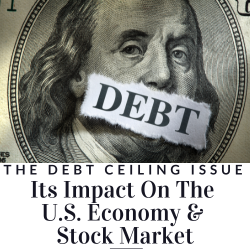
The Debt Ceiling Issue
Its Impact on the US Economy and Stock Market
Understanding the Debt Ceiling
Simply put, the debt ceiling is a legislative limit on the amount of national debt that the US Treasury can issue. It’s essentially the credit limit for the federal government. Sound complicated? Well, think of it like a credit card limit, but for the entire United States!
The History of the Debt Ceiling
The concept of the debt ceiling first emerged in 1917. Back then, it wasn’t created to limit spending, but rather to simplify the process of funding World War I. Fascinating, isn’t it?
How Does the Debt Ceiling Work?
When the federal government spends more than it collects in taxes (a situation we call a “budget deficit”), it borrows to make up the difference. The debt ceiling caps how much the government can borrow. But here’s the catch: Congress is in charge of both setting the budget and the debt ceiling. So the same folks who decide how much to spend also decide how much they can borrow!
Implications of the Debt Ceiling on the Economy
How the Debt Ceiling Affects Government Spending
The debt ceiling directly influences government spending. If the ceiling isn’t raised and the government reaches its borrowing limit, it may need to slash spending dramatically, which can cause a lot of disruption.
The Debt Ceiling and Inflation
Here’s another twist: hitting the debt ceiling could potentially affect inflation. If the government defaults on its debt, this could create uncertainty in the bond markets, potentially leading to higher interest rates and inflation.
Global Implications of the US Debt Ceiling
The US debt ceiling doesn’t just affect Americans—it has global implications. Why? Because the US dollar is the world’s reserve currency. If the US defaults on its debt, it could shake global financial markets, potentially leading to a worldwide economic downturn.
The Debt Ceiling and the Stock Market
Potential Impact on Stock Market Performance
When it comes to the stock market, uncertainty is the name of the game. And nothing breeds uncertainty quite like a looming debt ceiling crisis. If investors fear a default, they may start selling off their holdings, leading to falling stock prices.
Investor Sentiment and the Debt Ceiling
The debt ceiling can also affect investor sentiment. If investors perceive that the government might default on its debts, this can create fear and uncertainty, leading to volatility in the stock market.
Historical Effects of the Debt Ceiling on the Stock Market
Historically, debt ceiling debates have led to increased volatility in the stock market. For instance, during the 2011 debt ceiling crisis, the S&P 500 index fell by almost 17%.
The Debt Ceiling Debate
The Political Implications
The debt ceiling has become a political tug of war, often used as leverage in budget negotiations. This can create a lot of drama in Washington and uncertainty in the economy and the stock market.
The Pros and Cons of the Debt Ceiling
While some argue that the debt ceiling is necessary to curb government spending and debt, others contend that it creates unnecessary economic uncertainty and could potentially lead to a damaging default.
Managing national debt and avoiding negative consequences involves several strategies:
Fiscal Responsibility:
Governments need to be fiscally responsible. This means they should work to align revenue (from taxes and other sources) with spending. This could involve reducing unnecessary spending, increasing taxes, or a combination of both. Governments can also invest in areas like education, infrastructure, and technology that promote economic growth, which can increase revenue in the long term.
Economic Growth:
Promoting economic growth is another way to manage national debt. A growing economy means more corporate profits, higher incomes for individuals, and therefore, more tax revenue for the government. This extra revenue can be used to pay down the debt.
Monetary Policy:
Central banks, like the Federal Reserve in the U.S., can use monetary policy to manage interest rates and inflation. For example, in times of economic growth, the central bank might raise interest rates to keep inflation in check, which can also attract more investors to buy government debt.
Debt Restructuring:
In extreme cases, governments can negotiate with creditors to restructure their debt. This might involve extending the repayment period, reducing the interest rate, or even reducing the principal amount owed.
Conclusion
In conclusion, the debt ceiling issue in the US is a complex subject that directly influences the economy and the stock market. Its potential impact ranges from government spending and inflation to investor sentiment and stock market volatility. As the debate continues, it’s critical for investors and citizens alike to understand the implications of the debt ceiling.
FAQs
- What is the debt ceiling?
– The debt ceiling is a legislative limit on the amount of national debt that the US Treasury can issue.
- How does the debt ceiling affect the economy?
– The debt ceiling affects government spending, can potentially influence inflation, and has global economic implications.
- How does the debt ceiling impact the stock market?
– The debt ceiling can cause volatility in the stock market due to uncertainty and can affect investor sentiment.
- What are the political implications of the debt ceiling?
– The debt ceiling has become a political tool often used in budget negotiations.
- Are there any benefits to the debt ceiling?
– Some argue that the debt ceiling is necessary to control government spending and debt.
